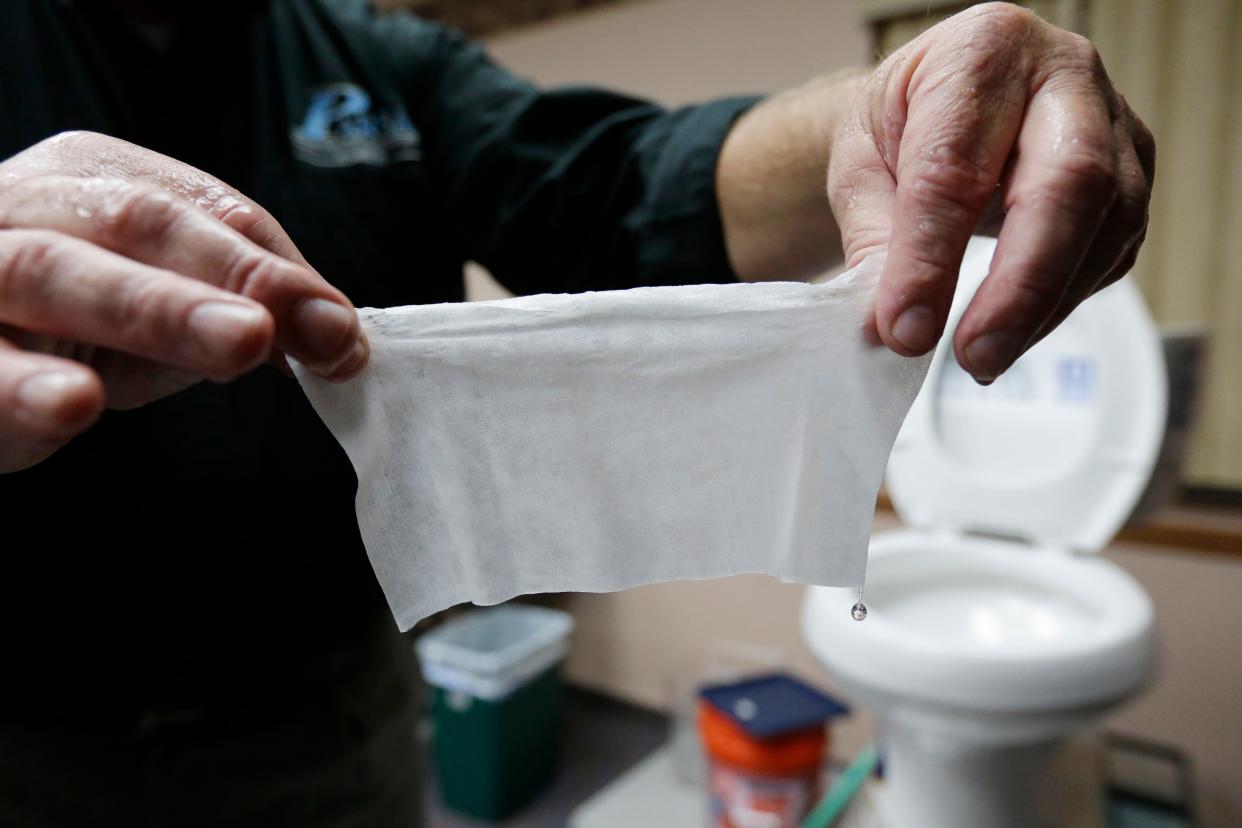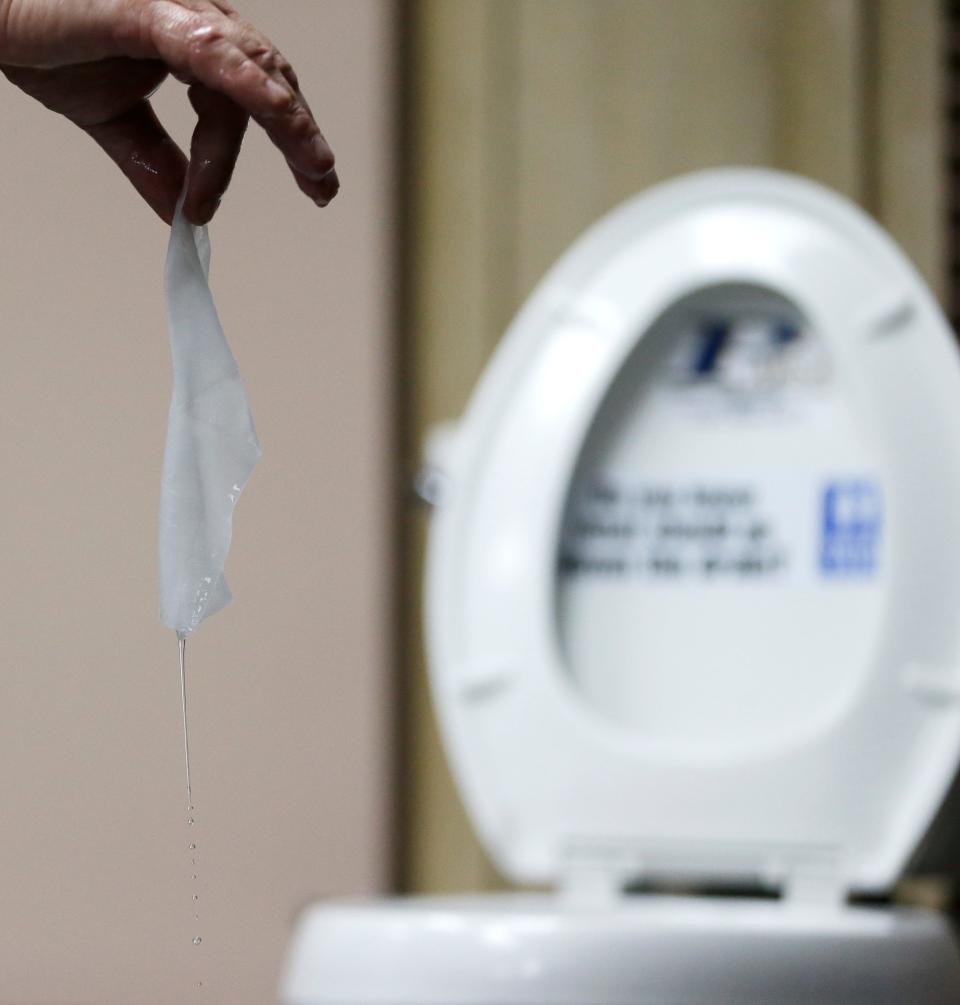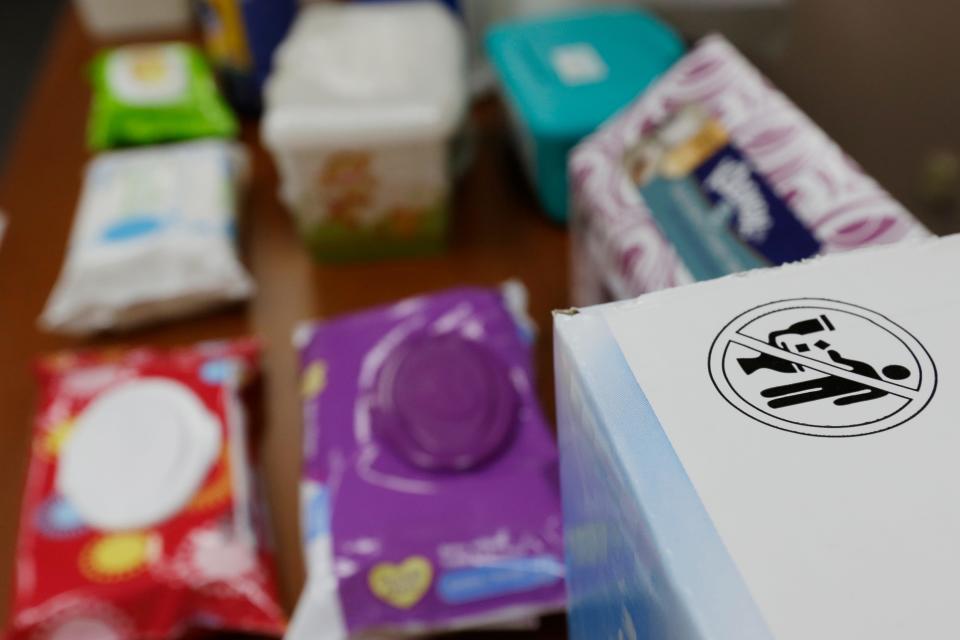Officials: Don't flush those 'flushable' wipes to help prevent sewer backups

It turns out that those "flushable" wipes that are often sold alongside regular toilet paper are not really flushable.
Local municipal officials are asking people to not flush any kind of wipes down the toilet, no matter what the packaging says.
“They indicate on the label that they are flushable. So people are obviously disposing of them by flushing them down the toilet, and they do not break down very well. So they can hang up and cause sewage blockages,” Tecumseh City Manager Dan Swallow said in an interview.
There were two incidents recently where sewage backed up into homes in Tecumseh because of wipe-induced clogs.
"So we’re trying to get the word out there that these wipes are not flushable," Swallow said. "They don’t break down. They’re very difficult to clean out of the sewers and so that’s been a challenge for us and many other communities across the country.”
Clinton Village Manager Kevin Cornish said in a release that baby wipes are problematic as well.
“The flushable wipes are very hard on the wastewater treatment plant because they get caught up in the processing equipment, which makes the sewer plant less efficient in cleaning the waste water before it is discharged into the river,” Cornish said in an email. “The wastewater treatment plant staff have to spend a significant amount of time pulling those wipes out of pumps and equipment. The wipes are labeled as ‘flushable’ however they are not and should not be flushed down the toilet.”

Blockages like these are not new. In 2018, utility workers in Macomb County broke up a 100-foot-long, 11-foot-wide "fatberg" in a sewer line there. It was made of congealed cooking grease and oils that mixed with wipes and other solids that had been flushed. Part of the mass of goo was donated to Wayne State University for research on how these blockages form.
They've caused problems from coast to coast, and even in the sewer system of at least one Air Force base. Beale Air Force Base in California in 2020 had a maintenance unit working 16-hour days to remove wipes from pipes and other sewer equipment, according to a story on the base website.
After the pandemic started and people started cleaning their homes more and sometimes turned to alternatives to toilet paper when stores ran out, wipes became the bane of sewer systems across the country.
This past October, California joined Washington, Oregon and Illinois in passing "do not flush" legislation requiring that packaging of certain wipes include labeling telling consumers not to flush the wipes.

Bills have been introduced in the U.S. House of Representatives and Senate by Rep. Alan Lowenthal, D-Calif., and Sen. Jeff Merkley, D-Ore., to set a national standard for labeling nonflushable wet wipes. They have the tentative name Wastewater Infrastructure Pollution Prevention and Environmental Safety Act, or the WIPPES Act. Michigan Reps. Lisa McLain, a Republican, and Andy Levin, a Democrat, are cosponsors of the House bill. No hearings have been held on the bills, according to Congress's website.
“Public awareness and education around smart flushing habits is the key to changing behaviors,” Lara Wyss, president of the Responsible Flushing Alliance, an organization created by the wipes industry to promote responsible consumer disposal habits, said in a release after the California bill became law. The RFA approved of the new law. “Protecting public infrastructure and the environment is a high priority for our alliance and we look forward to our continued cooperative efforts with wastewater agencies in California.”
"Non-flushable wipes do not break down as they travel through the sewer system, resulting in clogs and blockages that cost public utilities money, put workers at risk, and cause environmental harm," National Association of Clean Water Agencies CEO Adam Krantz said in a news release after the House bill was introduced last year. "Simply put, Toilets are Not Trashcans."
Daily Telegram news editor David Panian contributed to this report.
What not to flush
The Responsible Flushing Alliance, a group of producers of hygienic and cleaning wipes that promotes what can and cannot be flushed down toilets, says not to flush these items:
Baby wipes
Household cleaning wipes
Paper towels
Facial tissue
Makeup wipes
Fats, oils and grease
Food
Trash
Plastic bags
Rags and cloth
Disposable gloves
Cotton balls and cotton swabs
Dental floss
Feminine hygiene products
Hair or hair weaves
Medications
Syringes
SOURCE: Flushsmart.org
This article originally appeared on The Daily Telegram: 'Flushable' wipes not really flushable local communities say

